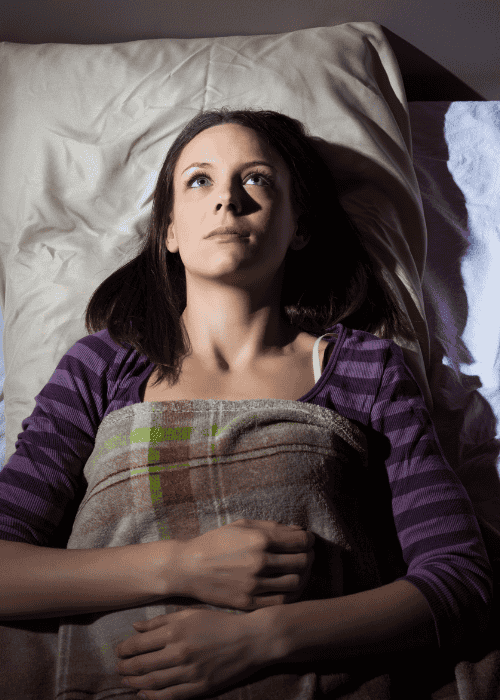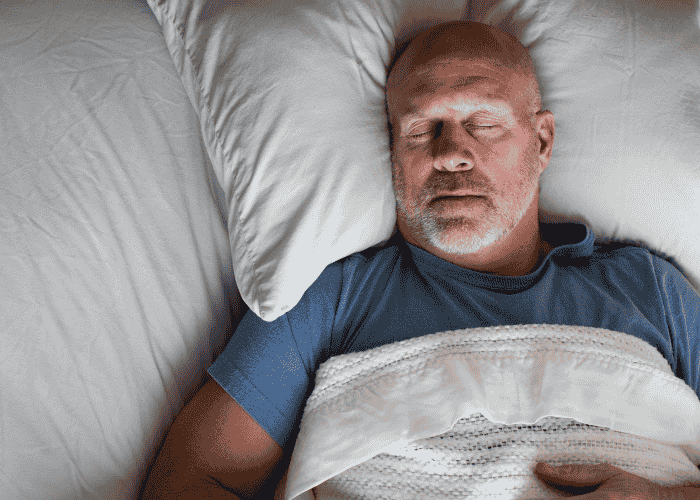Sleep Problems in Adults: Causes, Effects, & Solutions

Too many adults know the frustrations of lying awake at night, watching the clock tick by while morning gets closer. Or constantly waking up throughout the night and not being able to fall back to sleep. For some people, these restless nights are not overly frequent, but for others, sleep problems can become an ongoing problem that affects health, mood, and daily life.
While occasional insomnia in adults is normal – especially during times of stress – persistent problems with falling asleep, staying asleep, or feeling rested can signal deeper issues. Left unaddressed, stress and sleep problems can interfere with mental health, physical well-being, and relationships.
If sleep problems are affecting your ability to lead a functional, fulfilled life, a mental health professional can help you get to the root of the problem and find relief. This article can also work as a guide to sleep problems in adults, covering:
- Different sleep problems in adults
- The common causes of sleep problems
- The effects poor sleep can have on someone
- Strategies for coping with poor sleep
- Responses to commonly asked questions about sleep problems in adults.

Understanding Sleep Problems in Adults
Sleep problems are some of the most common health concerns that adults face. According to the Centers for Disease Control (CDC), one-third of adults report not getting enough sleep on a regular basis.1 This means that millions of people are going through life without the appropriate rest their bodies need to function well.
“Sleep problems” is a broad term that includes trouble falling asleep, frequently waking up during the night, waking up too early, or not feeling rested after a full night’s sleep. These difficulties might be because of stress or lifestyle changes. Or they might be related to a medical condition, mental health challenge, or sleep disorder.
The following are some common types of sleep problems in adults:
- Insomnia: Difficulty falling asleep, staying asleep, or waking up too early and not being able to fall back asleep
- Sleep apnea: Breathing interruptions during sleep that cause snoring, sudden waking, and poor quality rest
- Restless Leg Syndrome (RLS): Uncomfortable sensations in the legs and an irresistible urge to move them that can disrupt the ability to sleep
- Narcolepsy: A neurological disorder that causes sudden episodes of sleep, known as “sleep attacks,” and excessive daytime sleepiness
- Parasomnias: Unusual behaviors during sleep, such as sleepwalking, talking, or night terrors
It’s important to recognize that disrupted sleep is more than an inconvenience. When sleep is consistently a problem, it can impact all areas of our lives.
Common Causes of Sleep Disturbances
Sleep problems typically don’t occur out of the blue. Your environment, medical conditions, emotional well-being, and lifestyle choices can all influence these problems. The following sections cover some of the more common causes of sleep problems: lifestyle, behavioral, psychological, medical, and environmental factors.
Lifestyle and Behavioral Factors
Lifestyle and behavioral factors can result in fatigue and sleep loss. Here are some of these factors that might influence your sleep:
- Stress and worry: Having racing thoughts, looming deadlines, or personal concerns can make it difficult to “turn off” your mind at night. Over time, this pattern of overthinking at bedtime can condition the brain to associate night with stress rather than relaxation.
- Poor sleep hygiene: Certain habits can cause your body to struggle with sending signals for sleep, disrupting the natural sleep cycle. These include going to bed at irregular times, using screens late at night, or consuming alcohol or caffeine late (too close to your bedtime). In fact, a study on excessive phone use before bed showed that 65.7% of people reported poor sleep as a result.2
- Shift work or irregular schedules: Working late nights or rotating shifts can throw off people’s circadian rhythms (the internal clock that regulates sleep). This mismatch can leave people feeling out of sync, even on days off.
Mental Health Conditions
Mental health and sleep go hand in hand. When we’re feeling emotionally unwell, we often have a harder time sleeping, which contributes to our having a more difficult time emotionally.
- Anxiety and depression: Depression or anxiety-related sleep disturbances can create a cycle where poor sleep and mental health feed off each other. This is because both of these conditions can fuel restless nights, early waking, or difficulty falling asleep, with poor sleep worsening the anxiety or depression in return. For example, researchers found that people with insomnia were 10 times more likely to have depression and 17 times more likely to have anxiety.3
- PTSD or trauma: Trauma can cause nightmares, hypervigilance, or a heightened stress response that can make it difficult to fall asleep or stay asleep. Your body might also remain on high alert, even when there’s no immediate danger, disrupting restorative sleep.
Medical Conditions
Many health issues interfere with sleep. For example, chronic pain from arthritis, migraines, or fibromyalgia can prevent deep rest and leave people drained even after hours in bed. Sleep apnea can also disrupt breathing and cause repeated awakenings, raising long-term health risks if left untreated. Other conditions, such as GERD, thyroid problems, asthma, or neurological disorders, may also disturb sleep and often require both medical care and lifestyle changes for improvement.
Environment
Effects of Poor Sleep on Adults
The effects of continued poor sleep on adults can be wide-ranging. Over the upcoming sections, we’ll talk about some of the mental, physical, and relational consequences of continued sleep disturbances.
Cognitive and Emotional Effects
When we don’t get enough rest, our brains can have a harder time concentrating, storing memories, and making decisions.6 So, as a result of lack of sleep, most of us notice ourselves feeling more irritable, impatient, or easily overwhelmed. Sleep loss also typically heightens emotional reactivity, which can worsen symptoms of anxiety and depression.
Physical health consequences
Impact on Daily Functioning and Relationships
Sleep problems affect more than health; they can also shape how we live and connect with others. At work, fatigue often lowers productivity and increases the likelihood of mistakes. At home, lack of rest can create tension in relationships, as exhaustion makes patience and empathy harder to sustain.
Solutions & Treatment: Overcoming Sleep Disturbances
The right solution for sleep problems depends on the underlying cause, but there are many proven approaches that can help restore healthy rest. For many adults, lifestyle changes and therapy for sleep issues work best together.
The following are some solutions for coping with poor sleep:
Sleep Hygiene Strategies
Building better habits often creates the foundation for long-term rest. Sleep hygiene strategies typically include:
- Keeping a consistent bedtime and wake-up schedule
- Creating a calming nighttime routine, including room temperature and comfortable bedding
- Limiting caffeine, alcohol, or screen use before bed
These practical changes can not only improve sleep quality but may also help with coping with poor sleep when it arises.
Behavioral Therapy for Sleep Issues
Therapy is one of the most effective sleep disorder treatments, especially for insomnia. Cognitive behavioral therapy for insomnia (CBT-I) is particularly effective. It can help you identify unhelpful thought patterns, such as worrying about “never falling asleep,” and replace them with healthier perspectives and behaviors.8
Medical Sleep Disorder Treatments
When sleep difficulties are linked to medical conditions, adult sleep support may involve diagnostic testing and targeted care. Sleep studies can help identify disorders like sleep apnea, Restless Leg Syndrome, or narcolepsy. Doctors may recommend medications such as short-term sleep disorder treatments, but these are typically most effective when paired with therapy for sleep issues or other holistic approaches.
Mind-Body Approaches
Mind-body therapies provide another layer of adult sleep support. Practices such as yoga, meditation, and breathwork can promote relaxation and reduce stress, making it easier to fall asleep naturally. Light therapy may also help reset the circadian rhythm for those struggling with irregular schedules. Finally, relaxation techniques for sleep, including mindfulness, guided imagery, and progressive muscle relaxation, can quiet the mind and body, preparing for deeper rest.9
Mission Connection: Professional Support for Better Sleep
Living with ongoing sleep difficulties can feel frustrating and isolating, but you don’t have to face them alone. At Mission Connection, we recognize that sleep problems can lead to deeper issues such as stress, anxiety, trauma, or health conditions. This is why our approach goes beyond quick fixes and focuses on comprehensive adult sleep support.
Our team offers evidence-based therapy for sleep issues, including cognitive behavioral therapy (CBT), trauma-focused therapy, and mindfulness for sleep issues – tailored to your needs. When required, we can also collaborate with medical providers to ensure that sleep disorder treatments, such as sleep studies or medical interventions, are part of a coordinated plan.
Above all, Mission Connection creates a safe, compassionate space to address the emotional, physical, and environmental factors that impact rest. Whether you’re coping with poor sleep due to stress, medical challenges, or life transitions, we work with you to find strategies that restore balance, energy, and well-being. If sleep problems are affecting your health or daily life, reach out to Mission Connection today to learn how our personalized support can help you find lasting rest and renewal.

FAQs About Sleep Problems in Adults
While we hope this article helped you better understand sleep problems in adults, you may still have some concerns or questions. For this reason, we provide answers to some FAQs about sleep issues below.
What Causes Sleep Issues?
Sleep issues can stem from many factors, including stress, poor sleep hygiene strategies, medical conditions like sleep apnea, or mental health concerns such as anxiety and depression. In many cases, multiple causes overlap, which is why professional evaluation can help identify the root of the problem and guide effective sleep disorder treatments.
How to Cure Insomnia Quickly?
There isn’t usually a “quick cure” for insomnia, but there are steps that can bring relief. Short-term coping strategies may include relaxation techniques for sleep, limiting caffeine or alcohol, and creating a consistent bedtime routine. For long-term results, behavioral therapy for sleep issues – like CBT-I – is considered the gold standard.
What’s the Difference Between Occasional Insomnia and Chronic Sleep Problems?
Occasional insomnia is usually tied to stress, travel, or changes in routine – and it usually resolves on its own. Chronic sleep problems typically last for at least three nights a week over three months or more and often require structured therapy for sleep issues or medical evaluation.
When Should I See a Doctor or Therapist About Sleep Problems?
If sleep difficulties persist for more than a few weeks, interfere with daily functioning, or cause distress despite trying sleep hygiene strategies, it’s important to reach out for professional support. A clinician can recommend therapy for sleep issues, medical evaluations, or both.
Are Medications the Only Way to Treat Sleep Disorders?
No. While medications may provide temporary relief from sleep disorders in adults, they are not the only option. Many people benefit from therapy for sleep issues, relaxation techniques for sleep, or holistic sleep disorder treatments that address underlying causes.
How Does Mission Connection Provide Treatment for Sleep Problems?
Mission Connection provides individualized care that looks at both the root causes of sleep difficulties and the symptoms themselves. Our team uses behavioral therapy along with relaxation techniques for sleep and stress management tools. We also coordinate with medical providers when needed, ensuring that sleep disorder treatments, such as sleep studies or medical interventions, are part of a complete and compassionate plan.
References
- Liu, Y., Wheaton, A. G., Chapman, D. P., Cunningham, T. J., Lu, H., & Croft, J. B. (2016). Prevalence of Healthy Sleep Duration among Adults — United States, 2014. MMWR Morbidity and Mortality Weekly Report, 65(6), 137–141. https://doi.org/10.15585/mmwr.mm6506a1
- Arshad, D., Joyia, U. M., Fatima, S., Khalid, N., Rishi, A. I., Rahim, N. U. A., Bukhari, S. F., Shairwani, G. K., & Salmaan, A. (2021). The adverse impact of excessive smartphone screen-time on sleep quality among young adults: A prospective cohort. Sleep Science, 14(04), 337–341. https://doi.org/10.5935/1984-0063.20200114
- Taylor, D. J., Lichstein, K. L., Durrence, H. H., Reidel, B. W., & Bush, A. J. (2005). Epidemiology of Insomnia, Depression, and Anxiety. SLEEP, 28(11), 1457–1464. https://doi.org/10.1093/sleep/28.11.1457
- Okamoto-Mizuno, K., & Mizuno, K. (2012). Effects of thermal environment on sleep and circadian rhythm. Journal of PHYSIOLOGICAL ANTHROPOLOGY, 31(1). https://doi.org/10.1186/1880-6805-31-14
- Silver, N. (2024, October 28). What is the best temperature for sleep? Healthline. https://www.healthline.com/health/sleep/best-temperature-to-sleep#why-this-temperature
- Khan, M. A., & Al-Jahdali, H. (2023). The consequences of sleep deprivation on cognitive performance. Neurosciences, 28(2), 91–99. https://doi.org/10.17712/nsj.2023.2.20220108
- Ding, X., Hwang, F., Silverman, D., Zhong, P., Li, B., Ma, C., Lu, L., Jiang, G., Zhang, Z., Huang, X., Tu, X., Tian, Z. M., Ding, J., & Dan, Y. (2025). Neuroendocrine circuit for sleep-dependent growth hormone release. Cell. https://doi.org/10.1016/j.cell.2025.05.039
- Walker, J., Muench, A., Perlis, M., & Vargas, I. (2022). Cognitive Behavioral Therapy for Insomnia (CBT-I): A primer. Clinical Psychology and Special Education, 11(2), 123–137. https://doi.org/10.17759/cpse.2022110208
- Black, D. S., O’Reilly, G. A., Olmstead, R., Breen, E. C., & Irwin, M. R. (2015). Mindfulness meditation and improvement in sleep quality and daytime impairment among older adults with sleep disturbances. JAMA Internal Medicine, 175(4), 494. https://doi.org/10.1001/jamainternmed.2014.8081
